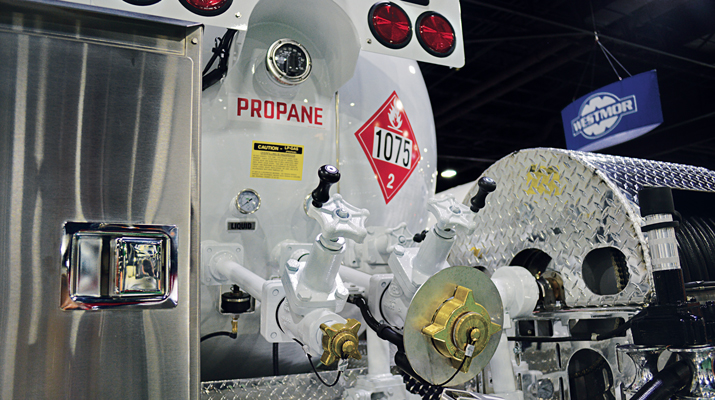In the Know: Truck purchases
In the Know is a monthly partnership between LP Gas and Propane Resources. This month, Shawn Treat discusses how to purchase the right truck for your propane business.

Consider the volume and weight of the propane you plan to haul regularly to determine the appropriate truck size. (Photo by LP Gas staff)
QUESTION: What tips should propane retailers consider when purchasing a truck?
ANSWER:
Purchasing the right truck for your propane business is a decision that requires thorough research and careful consideration. The ideal vehicle should not only fit your operational needs but also align with your budget, ensuring your fleet is both efficient and cost-effective. Here are key factors to consider when buying a truck for your propane business.
⦁ Truck size and load capacity. The first and most crucial consideration is the truck’s size and its ability to handle your typical propane load. It’s essential to select a truck with the right payload capacity to safely and efficiently transport propane tanks. Overloading can lead to mechanical failures and safety hazards, while underutilizing a truck’s capacity can result in inefficient operations. Consider the volume and weight of the propane you plan to haul regularly to determine the appropriate truck size.
⦁ Budget and cost considerations. Your budget plays a pivotal role in the decision-making process. While new trucks come with higher upfront costs, they also offer the security of a warranty, potentially saving on repair costs in the initial years of ownership. Conversely, used trucks can be more budget-friendly upfront, but may carry hidden costs in maintenance and repairs. Weigh the pros and cons, including the option of purchasing an extended warranty for a new truck, to find a balance between cost and reliability.
⦁ Cab design. The design of the truck’s cab should fit the needs of your drivers and operations. Comfort, ergonomics and accessibility are important for driver satisfaction and efficiency, especially for businesses that require long hauls. Assess the cab design for comfort features, visibility and ease of access to controls, ensuring it meets the requirements of your daily operations.
⦁ New vs. used trucks. Deciding between a new or used truck involves evaluating the benefits and drawbacks of each. New trucks offer the latest technology and a warranty but come at a premium price. Used trucks, while more affordable, may require additional maintenance and have a shorter lifespan. When considering a used truck, verify its history, including the title and VIN, and conduct a thorough inspection to check for mechanical issues, leaks, and wear and tear.
⦁ Maintenance and inspection. Regular maintenance is crucial for both new and used trucks to ensure longevity and reliability. Before finalizing the purchase of a used truck, conduct a comprehensive inspection. Look for signs of oil and transmission leaks, abnormal wear and tear, and ensure all fluids are at the correct levels. Review the vehicle’s maintenance records to assess how well it has been cared for. This proactive approach can prevent costly repairs and downtime.
⦁ Location of purchase. The location from which you purchase your truck can significantly impact the overall cost, especially when considering transportation or delivery fees. Evaluate the proximity of the seller and the logistics of bringing the truck to your business location. Sometimes, a slightly more expensive truck nearby can be more cost-effective than a cheaper option far away when transportation costs are factored in.
⦁ Researching the seller. The reputation of the seller is as important as the truck itself. Conduct due diligence on the seller to ensure they are reputable and have a positive track record. This is especially crucial when purchasing used trucks, as a reputable seller is more likely to provide vehicles that are accurately described and in good condition. Check reviews, ask for referrals, and confirm the seller’s reliability before making a commitment.
Purchasing a truck for your propane business involves balancing various factors, including the vehicle’s capacity, cost, design and the credibility of the seller. Whether opting for a new or used truck, thorough research and careful consideration will guide you to the best decision for your business needs and budget.
Remember, the right truck is a critical investment in your company’s efficiency, safety and profitability.
Shawn Treat is director of operations and safety at Propane Resources. He can be reached at shawn@propaneresources.com or 417-631-8595.
















